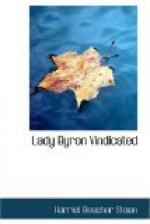’Who has sought to distinguish between the holy and the unholy in that spirit? to prove, by the very degradation of the one, how high the other was. A character is never done justice to by extenuating its faults: so I do not agree to nisi bonum. It is kinder to read the blotted page.’
These letters show that Lady Byron’s idea was that, even were the whole mournful truth about Lord Byron fully told, there was still a foundation left for pity and mercy. She seems to have remembered, that if his sins were peculiar, so also were his temptations; and to have schooled herself for years to gather up, and set in order in her memory, all that yet remained precious in this great ruin. Probably no English writer that ever has made the attempt could have done this more perfectly. Though Lady Byron was not a poet par excellence, yet she belonged to an order of souls fully equal to Lord Byron. Hers was more the analytical mind of the philosopher than the creative mind of the poet; and it was, for that reason, the one mind in our day capable of estimating him fully both with justice and mercy. No person in England had a more intense sensibility to genius, in its loftier acceptation, than Lady Byron; and none more completely sympathised with what was pure and exalted in her husband’s writings.
There is this peculiarity in Lord Byron, that the pure and the impure in his poetry often run side by side without mixing,—as one may see at Geneva the muddy stream of the Arve and the blue waters of the Rhone flowing together unmingled. What, for example, can be nobler, and in a higher and tenderer moral strain than his lines on the dying gladiator, in ‘Childe Harold’? What is more like the vigour of the old Hebrew Scriptures than his thunderstorm in the Alps? What can more perfectly express moral ideality of the highest kind than the exquisite descriptions of Aurora Raby,—pure and high in thought and language, occurring, as they do, in a work full of the most utter vileness?
Lady Byron’s hopes for her husband fastened themselves on all the noble fragments yet remaining in that shattered temple of his mind which lay blackened and thunder-riven; and she looked forward to a sphere beyond this earth, where infinite mercy should bring all again to symmetry and order. If the strict theologian must regret this as an undue latitude of charity, let it at least be remembered that it was a charity which sprang from a Christian virtue, and which she extended to every human being, however lost, however low. In her view, the mercy which took him was mercy that could restore all.
In my recollections of the interview with Lady Byron, when this whole history was presented, I can remember that it was with a softened and saddened feeling that I contemplated the story, as one looks on some awful, inexplicable ruin.
The last letter which I addressed to Lady Byron upon this subject will show that such was the impression of the whole interview. It was in reply to the one written on the death of my son:—




